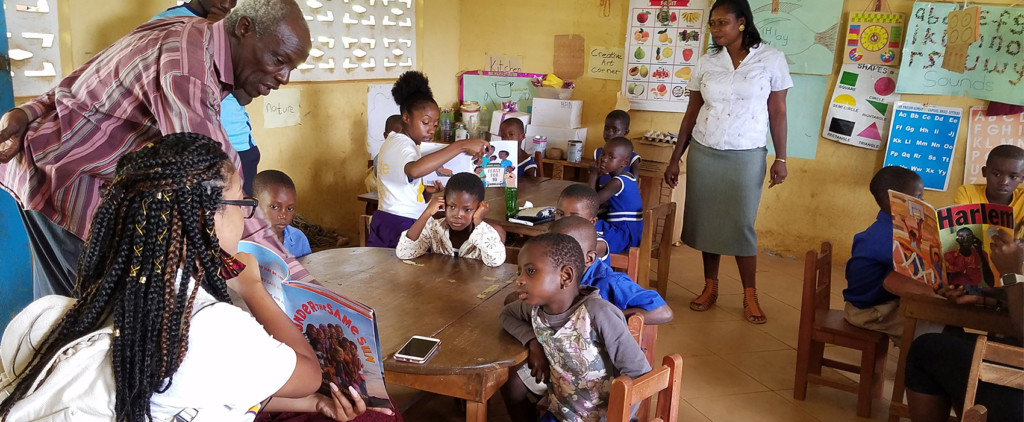PRAIRIE VIEW, Texas (June 25, 2021) – Prairie View A&M University (PVAMU) is spearheading a new multidisciplinary effort to help improve food security, sustainable agriculture, renewable energy and social welfare in Africa. Led by Camille Gibson, interim dean of the College of Juvenile Justice, with the assistance of Godlove Fonjweng, executive director of the Office of International Programs, the Pacesetters Initiative will gradually link to courses within PVAMU’s Colleges and Schools of Engineering, Agriculture and Human Sciences, Business and Juvenile Justice, and eventually provide students with the opportunity to travel abroad to conduct research and learn and work alongside students, faculty and industry leaders in specific African nations.
The Pacesetters Initiative was designed and introduced to the university by Veola Green, executive managing director of The International Institute of Family Development Inc., an entity that connects academics and industry to realize real-world solutions to problems in developing nations. Through the new relationship, PVAMU has forged formal academic partnerships with:
- Kenyatta University, Kenya
- Great Lakes University of Kisumu, Kenya
- The University of The Gambia, The Gambia
- The University of Liberia, Liberia
- Covington University, Liberia
- Bong County Technical College, Liberia
“It’s an opportunity, in keeping with the university’s Quality Enhancement Plan for the next decade, for our students to be more internationally engaged with serious issues,” said Gibson, who is also a professor of justice studies at PVAMU.
“The Pacesetters Initiative opens the possibility to build the resumes and skillsets of both African and HBCU students,” echoed Green, whose for-profit institute boasts connections to many leading figures on the continent, including P. L. O. Lumumba, current director of The Kenya School of Law (one of the participating partner universities) and a leading figure in the Pan-Africanism movement. “We hope this dynamic connection can solve real-world problems.”
Each of the colleges is following its own path into the Pacesetters Initiative. For example, Sarhan M. Musa, a professor in the Roy G. Perry College of Engineering, is scheduled to kick off the venture this summer with the University of Liberia. Gibson described the current Liberian state of affairs with regard to agriculture and supply chain management as one that could benefit greatly from educational assistance that could pave the way for massive improvements to food systems-based infrastructure.
“They have a lot of crops, they tell us, that just fall to the ground and go to waste because they don’t have the infrastructure for refining and manufacturing,” Gibson explained. “They have lots of peanuts, but they buy peanut butter from other countries because they don’t have what it takes to make it. It is the same with mangoes, tomatoes and various things that they watch every year go to waste.”
The PVAMU team that would help their Liberian counterparts would reflect those specific needs, supplying experts in supply chain management and solar energy (in which the Liberians have expressed a strong interest), along with students who could bring fresh perspectives and, in turn, learn of other ways of viewing the world and approaches to problems. Professor Musa would lead a month-long course of study with intense weekly instruction on developing solar energy in these areas on Zoom, as the pandemic continues to rage across Africa.
While College of Business faculty lead on supply chain management and College of Agriculture faculty lead on farming and food refinery development, the College of Juvenile Justice will begin its portion of the program in the 2021-2022 academic year, targeting human trafficking in partnership with three entities in Kenya: Great Lakes University, Center for African Volunteers and Lumumba’s PLO Foundation.
“They have concerns about women and children being abused and exploited, given difficulties related to poor economics,” said Green. “Next year, we will work with them to think about policy, practice and programs. We expect to go full steam when society opens up.”
“The beauty of the Pacesetters Initiative’s having such a broad-based agreement is that each component can start at a different time,” said Fonjweng. His office, in early June, released a memorandum indicating that faculty-led programs would be able to start up next spring. He has been organizing workshops for faculty, which commenced this month. “We will help guide and support them,” Fonjweng said. The goal for some of the workshops is to help faculty frame their work in the context of the United Nations’ sustainable development goals to better connect their efforts to the Pacesetters Initiative. That will lead to natural travel opportunities down the road.
“Part of my vision here is to infuse global content in our teaching, research and service functions at the university,” said Fonjweng. “So broadly speaking, I want to see students enhance their global competencies by engaging in these projects and have international students and faculty from these partner institutions come to PV. I would also like to see some elements of these efforts embedded in our curriculum to benefit those students who are unable to travel. I am glad we’re engaging and learning about different parts of the world while also making the world know us.”
By Andrew Cohen
-PVAMU-

